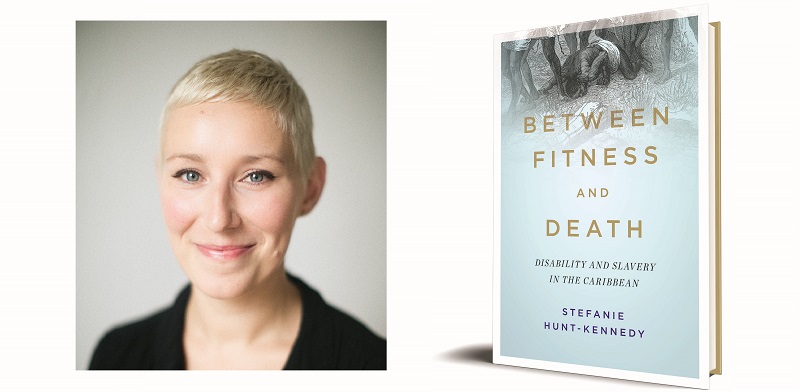UNB researcher receives book, journal awards for groundbreaking work on race and disability
Author: UNB Research
Posted on Dec 10, 2021
Category: Research , Accolades , Publications

What happens when disability and race intersect? For Dr. Stefanie Hunt-Kennedy, it opens a window into an entire area of history previously left to the margins.
Dr. Hunt-Kennedy is an associate professor of Caribbean, Atlantic World and Disability history at the University of New Brunswick, and the author of Between Fitness and Death: Disability and Slavery in the Caribbean (University of Illinois Press, 2020).
She’s also the recipient of the 2021 Disability History Association (DHA) Outstanding Book Award, as well as its 2021 Journal Article / Book Chapter Award for her article, “‘Had his nose cropt for being formerly runaway’: disability and the bodies of fugitive slaves in the British Caribbean.”
This makes her the first-ever scholar to receive both awards, which are adjudicated by separate, independent panels.
“It is an absolute honour to be recognized by my peers in the disability history community,” she says. “It is such an incredible group of scholars and I have felt nothing but support and encouragement from them over the years. Disability history is such an exciting and cutting-edge field and to receive these two awards, and be the first person to do so, is very, very special.”
In their announcement, the DHA describes Dr. Hunt-Kennedy’s book as “an insightful and powerful study” that is “’elegantly and thoroughly researched, argued, and written,’ and expands scholarly capacities for attending to the interconnections between disability and race.”
Her research brings ableism and racism together in the context of plantation slavery in the Caribbean, and in doing so uses the study of disability to illuminate our understanding of slavery.
“The concept of disability in the field of history is not a new idea but has not yet been fully explored. I noticed that while slavery scholars had been writing about the violence of slavery, they hadn’t considered that many enslaved people became disabled from such violence. At the same time, disability history has traditionally been quite Eurocentric and whitewashed and had not included Caribbean bondspeople as part of broader histories of disability and labour.”
Central to her research is the idea that this intersection between racism and ableism was tied to white, European power; and that it was central to a European construction of Black, African enslaved persons as deformed, subhuman, lacking intelligence and fit only for the brutal physical labour of plantation work.
In addition to being a precursor stereotype that supported enslavement as a practice, the intersection of disability and enslaved blackness manifested in other ways: disabled enslaved people were seen as ‘less valuable’ when it interfered with their productivity, and slaves were punished in ways that could cause disability, further impacting their lives. Disability could also at times be either concealed, utilized and even valued by enslaved persons, transforming it into something advantageous.
“In other words, the violent production of disability is the heart of histories of blackness in the Atlantic world. It impacted both the representation and the lived experience of enslaved persons, it was used to silence opposition to slavery, and it kept the enslaved in the liminal space between fitness and death.”
Ultimately, Dr. Hunt-Kennedy’s research leads her to propose that when this intersection is brought to the centre, it challenges our understanding of the timelines and construction of modernity.
“Disability history posits that disability did not exist in the pre-modern, pre-industrial era. But when we look at the Caribbean, we find a precociously industrial and modern enterprise in sugar plantations. Although the Caribbean has been forgotten about in the definition of modernity, plantation slavery was a necessary precondition of both industrialization and modern concepts and displays of disability.”
Dr. Hunt-Kennedy completed her PhD in history at the University of Toronto (2015), where she was the recipient of the Michael Finlayson Gold Medal for the Most Outstanding Dissertation. She joined UNB in 2016, where she teaches a range of courses on Caribbean history, comparative slavery and emancipation in the Atlantic World, disability history and histories of race. Her research examines histories of disability, race and the body in the colonial Caribbean and Afro-Atlantic World, with a particular focus on the sugar-producing colonies of the British Caribbean.
More information
Dr. Stefanie Hunt-Kennedy | Department of History | Faculty of Arts
Research at UNB | Graduate Studies at UNB | Postdoctoral fellowships
Between Fitness and Death is available at UNB Libraries, as is her article ‘Had his nose cropt for being formerly runaway.’